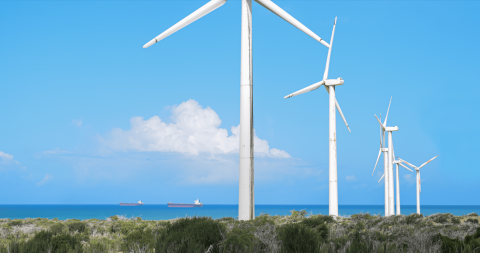
Issues and recommendations from the first EITI Energy Dialogue
On 9 November 2021, a group of African Ministers met in the context of the EITI Energy Dialogue, at the margin of the Africa Oil Week, to discuss the unique challenges and opportunities which the energy transition presents for Africa.
The session was co-moderated by Francess Alghali, EITI Board Member and Minister of State in the Office of the Vice President of the Republic of Sierra Leone and Bady Baldé, Deputy Executive & Africa Director at the EITI International Secretariat. Ministers and senior officials from Benin, Botswana, the DRC, Djibouti, Mauritania, Senegal, Sierra Leone and Uganda as well as representatives from the US Department of State attended the meeting.
While the discussions showed that African countries were at different levels in terms of energy production and oil and gas exploitation and exploration, and may require different interventions on the pathways to energy transition, a growing consensus is emerging. The following points were documented as the key issues and recommendations discussed:
All government representatives emphasised the urgent need to address the energy needs of Africa’s people as a necessary foundation for meeting their shared development objectives and reduce inequalities.
They acknowledged that the climate crisis is a real and present emergency, that affects the most vulnerable communities in Africa and around the world.
They noted the need for collective action to address this crisis but emphasised that industrialised nations are primarily responsible for the stock of CO2 in the atmosphere and that the transition to low carbon economies must be done in a fair and equitable manner.
They noted that the African Union goals and priorities for 2063 envisage environmentally sustainable and climate resilient economies and communities and sustainable natural resource management.
They acknowledged their shared belief that natural resource wealth should be managed responsibly to contribute to economic growth, help reduce poverty and ultimately contribute to achieving the UN Sustainable Development Goals.
They further acknowledged that the global shift envisaged through the transition to low carbon economies will require a transformation of the extractive industries and will expose oil and gas producing countries to new risks and opportunities.
They discussed the following recommendations:
Plan for the energy transition by identifying development priorities and investment opportunities for the energy and extractive sectors in line with national and international climate change commitments.
Prepare for a global shift in demand and financing for fossil fuels, in line with the Paris Agreement, by seeking out ways to develop clean and renewable energies to increase energy access and energy security in a sustainable manner.
Align national policies on climate change, energy, extractives and the environment to ensure common and coherent goals.
Strengthen coordination and integration, recognising that a holistic approach can yield benefits, by situating energy, extractive and environmental policies in a broader development context.
Use international standards and benchmarks, such as the Extractive Industries Transparency Initiative (EITI), to ensure that transparency, open and inclusive dialogue will underpin planning and preparedness for the energy transition.
Engage citizens and industry representatives in policy dialogue to build trust in the way the government is planning, and mitigating against, the potential impacts of the climate crisis.
They further emphasised that actions are required by countries which bear historic responsibility for emissions, including:
Urgent action to reduce their own emissions and meet their climate finance commitments.
Supporting African nations to meet the energy needs of their citizens in a sustainable manner.
Provide technical and financial support to alleviate the climate crisis in the most vulnerable communities.
Ensure transparency and accountability in the implementation of governments’ global commitments to transition to net zero emissions.
Invest in sustainable projects that can help alleviate poverty.
Uphold the highest environmental safeguards, adhere to national and international laws for taxation and contributions to local economic development, and support countries where they operate in meeting net zero targets.
Finally, they tasked the International Secretariat to coordinate closely with the African Union and the African Development Bank to convene further high-level dialogues to develop a common position for Africa on the energy transition, agree time-bound commitments and monitor progress.



